The International Energy Agency (IEA) and the European Commission outlined on 21 April 2022 a range of simple steps that citizens can take to reduce their energy use and save money, and that would save enough oil to fill 120 super tankers and enough natural gas to heat almost 20 million homes if adopted by all. These actions, designed to help Ukraine by cutting the EU’s reliance on Russian fuel and reduce greenhouse gas emissions, were presented and discussed by IEA Executive Director Fatih Birol and European Commission Director-General for Energy Ditte Juul Jørgensen during a live-streamed virtual event.
The average heating temperature within homes across the European Union is over 22 °C, but many could comfortably accommodate 19 °C or 20 °C. Turning down the thermostat in your home by just 1 °C would save around 7% of the energy you use for heating. For every degree you lower the heating on average, you could cut more than EUR 70 from your annual energy bill. If you live in a building with a centralised heating system, you can work with neighbours and building managers to explore the possibility of turning down the temperature of the communal boiler.
Setting your air conditioner 1 °C warmer could reduce the amount of electricity used by almost 10% and save you EUR 20 a year. You can also reduce heating and air conditioning temperatures when rooms are not in use or adjust the temperature according to the type of room (you don’t need to have the same temperature in your bedroom and bathroom, for example).
Adjusting the thermostat not only makes a difference in homes but in all types of buildings – companies and public institutions should also consider applying this measure in offices.
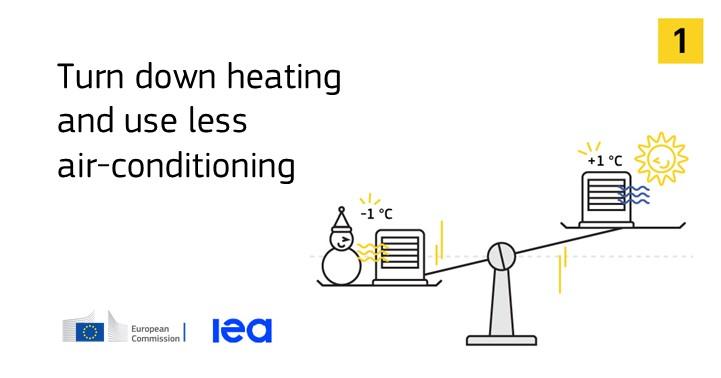
In many homes and workplaces, default settings on boilers can often be adjusted to increase efficiency and save up to 8% of the energy used to heat rooms and water if you have a condensing boiler. Setting up your boiler properly could save around EUR 100 each year. If you don’t know how to do it, consult your boiler’s manual or ask for advice during the annual servicing of your boiler.
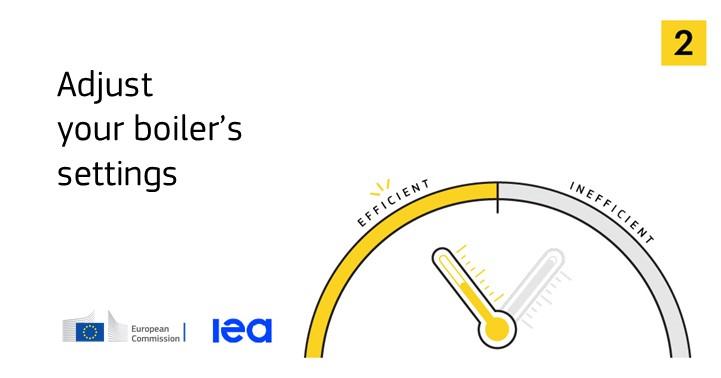
Commuting accounts for around a quarter of the oil used by cars in the European Union, and the average one-way car commute is around 15 kilometres. However, more than a third of jobs in the European Union could be done from home. Teleworking should be encouraged by employers: every time you work from home, you save money and avoid burning fuel. If your job allows it, working at home three days a week could reduce your household fuel bill by around EUR 35 a month, even after taking into account the increased energy use at home.
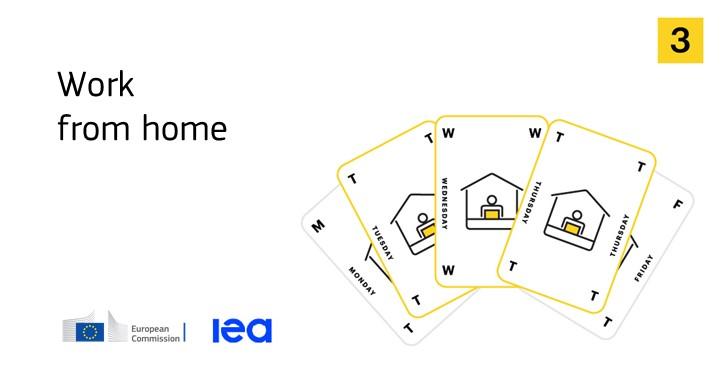
Most car trips in the European Union are made with just a single occupant. Pooling your car journeys with neighbours, friends or colleagues saves fuel and money. Setting your car’s air conditioning 3 °C warmer will also immediately improve the car’s fuel economy. These combined actions could save your household around EUR 100 per year.
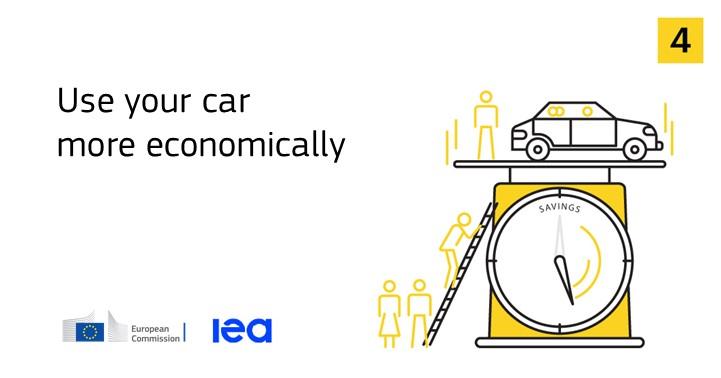
Driving too fast is inefficient for the car engine and wastes fuel. The average car in the European Union clocks up around 13 000 kilometres a year. By reducing your average cruising speed on motorways by 10 kilometres an hour, you could cut your household fuel bill by around EUR 60 a year.
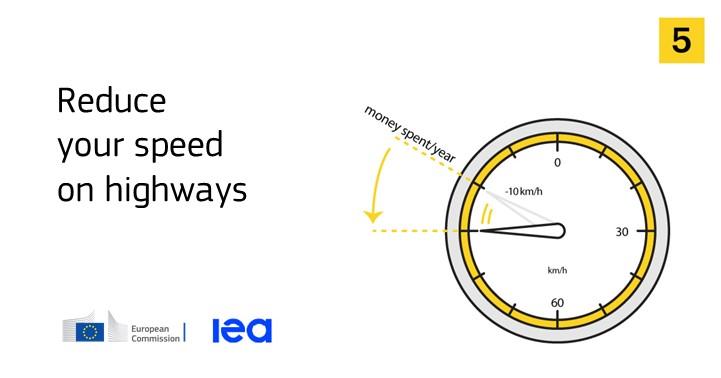
Cities should promote car-free Sundays and do them often. Car-free Sundays are already a regular fixture in many countries and cities. Brussels, Edinburgh, Milan, Paris have all used them to promote public health, community-oriented spaces and cultural events. More than 3 000 towns and cities registered for the European Mobility Week in 2021, which included a commitment to a car-free day. If you live in a large city, leaving your car at home every Sunday could save your household EUR 100 a year.
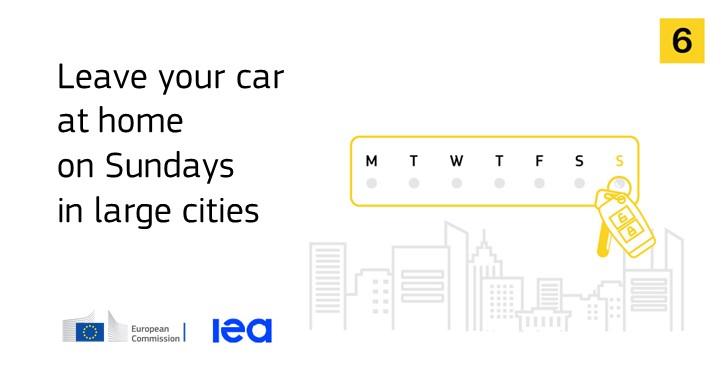
Leaving your car at home for short journeys, especially if it is a large car, saves a significant amount of fuel. On average, around a third of car journeys in the European Union are less than 3 kilometres. By using other means of transport, you’ll help reduce air pollution and congestion in your area and potentially improve your health. And you can save money – over EUR 55 per household every year potentially – by walking, cycling or using micromobility (such as an electric scooter) for short journeys. Fourteen EU countries have at least one tax-incentive or purchase subsidy for bikes or electric bikes.
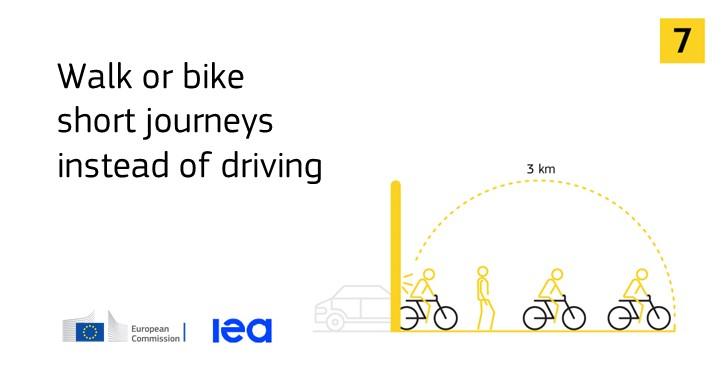
If you can commute to work on public transport rather than driving your car, it’s worth doing so to reduce oil consumption. The spare capacity on public transport during peak travel periods differs depending on the system, and on the country and city. However, there is typically spare capacity in off‐peak periods that can be used to “spread out” the peak if employers allow flexible working hours. Public authorities can play an important role through temporary incentives to reduce fares for public buses, metro systems and light rail.
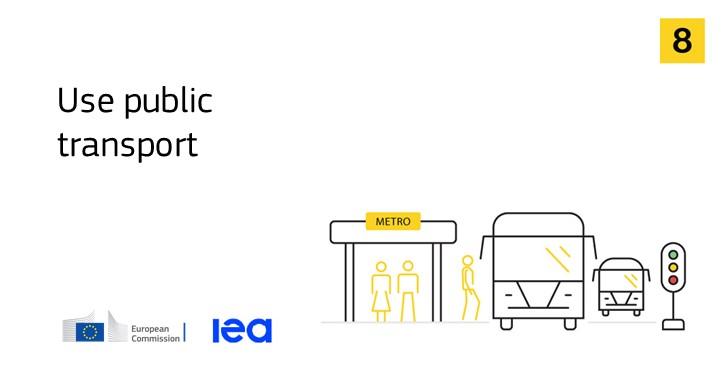
For distances under 1 000 km, high-speed trains provide a high-quality substitute for flying. Consider taking a train rather than a plane whenever practical and affordable. Employers should encourage train journeys instead of short-haul flights for employees’ business travel or promote virtual meetings instead of travelling. Night trains are an option for travelling even longer distances and have the advantage of spreading traffic across different times of the day. Based on existing high-speed rail infrastructure, just under 5% of plane journeys in the European Union could be done by train instead, including both leisure and business travel.
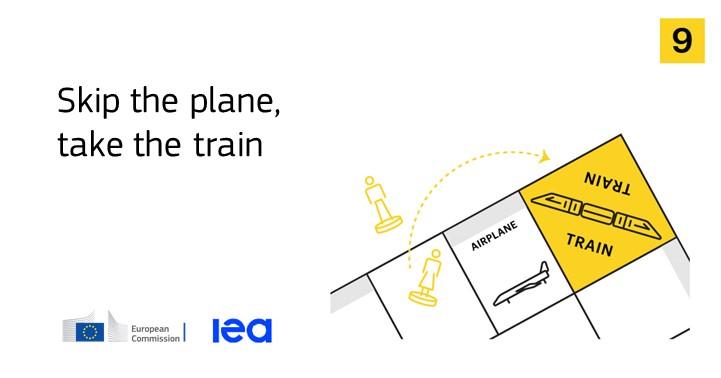
Related links
- Report: Playing my part – how to save money, reduce reliance on Russian energy, support Ukraine and help the planet (IEA)
- Press release: Key energy saving actions, 21 April 2022

